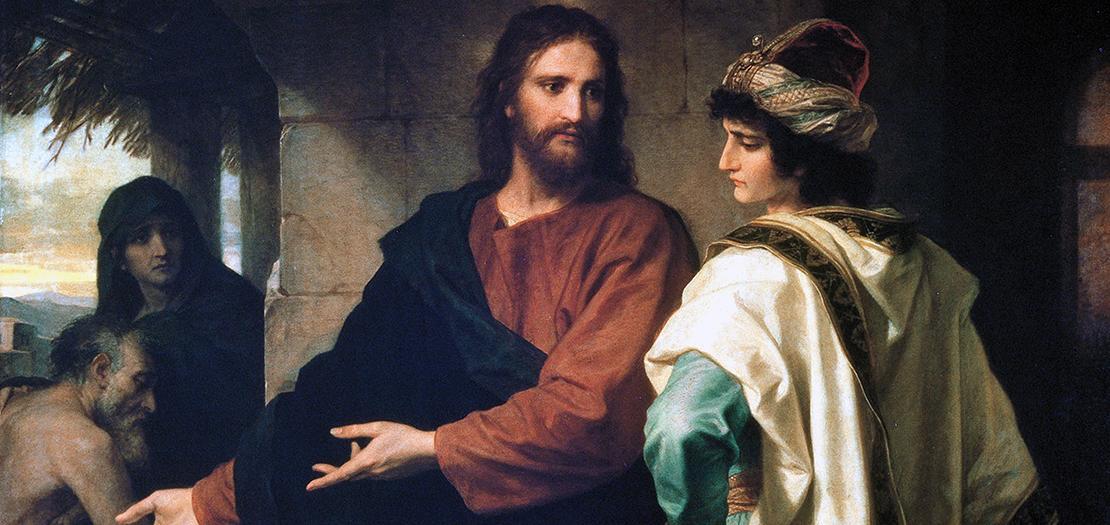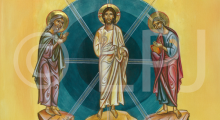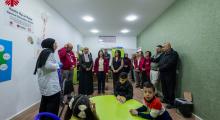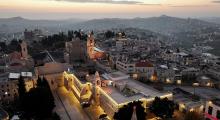Issued by the Catholic Center for Studies and Media - Jordan. Editor-in-chief Fr. Rif'at Bader - موقع أبونا abouna.org

Following is the text of the meditation by Latin Patriarch of Jerusalem His Beatitude Pierbattista Pizzaballa for the 28th Sunday of ordinary time, year B, October 10, 2021:
Entering the episode narrated in today’s Gospel passage, let us take a step back and return to the observation with which we finished the meditation of last Sunday.
We said that to the disciples, all caught up in their delusions of grandeur, Jesus proposes as a style of life an embrace or rather a gesture of softness.
This very softness can be the key with which to understand the encounter between Jesus and the rich man, recounted by Mark in Chapter 10.
In it we find, in fact, the same shift of levels: from a level where we see the nameless and wealthy man, from that of observance, doing, possessing, merit and calculation to a level where Jesus looks at him, the level on which Jesus wants to meet him, which is that of love. Jesus, in fact, looks at him and loves him (Mk 10:21), the man who lacks nothing else (Mk 10:21) except this: love! But it is precisely this deficiency that makes him dissatisfied and restless in the quest for life.
Because as long as life remains on the level of duty, of a well-being that is proportionate to our observance and cleverness, life can only remain uncertain, like one who has never found the essential: he basically remains closed in on himself.
Eternal life, on the contrary, comes from the encounter with the other, from gratuitous love with which we are looked at: the man has done nothing to deserve this gaze of Jesus, yet in no other part of Mark’s Gospel, in no other encounter is this expression used so strongly as here, by which Jesus looks at and loves him.
Following begins there, where this gaze becomes central in life, becomes life. All the rest – riches, observances, laws, relationships, problems – is relativized, and assumes a new meaning starting from this gaze of Jesus’ love, where one can always return and tap into it. It is this gaze that makes us live.
Then life changes direction: for those who encounter the Lord, there is always something in common, and that is that their life takes another turn, another route. From the Magi to Zacchaeus, for all life changes. An obvious example, and close to the passage that we are reading today, is that of Bartimaeus, who encounter Jesus on the way from Jericho (Mk 10:46-52): he is seated on the road begging, hearing Jesus passing by, calls out to Him and is healed; and “at one he sees again and follows along the road” (Mk 10:52). He sees and changed course, namely, his way becomes the same way of Jesus, the one that goes up to Jerusalem.
The rich man of today’s reading, instead, does not see and therefore does not change course. He returns by the way that he came as if swallowed by nothing; his way does not become following, despite all the enthusiasm and good intentions with which he approached the Lord.
Why does he not see?
We said that today’s episode is unique in Mark’s Gospel, where it’s said that Jesus looks and loves. Paradoxically, it is one of the few missed encounters.
To say that there is the risk of not seeing this gaze, of not letting oneself be reached in depth by it. And this for a thousand reasons.
Today’s rich man does not accept because he has no space within, because he cannot make space, to be empty: his heart is attached to his goods, and from these, he’s hoping for life. He loves something else; he’s already busy with something else. This preoccupation is his sickness, an illness Jesus later says, from which it is tough to heal (“Jesus, turning around looked and said to his disciples, “How hard it is for those who have wealth to enter the kingdom of God!” Mk 10:23). It is that illness for which religious experience is not intended as a self-emptying, but an enrichment, an expansion of the self.
The wealth that clutters the heart does not necessarily correspond to material wealth: it can also be an idea, or a memory, or a person, or a claim, a place, a choice, a feeling, a person.
But then is there no hope?
A hope the text gives a glimpse of, and it is the sadness of the man who goes away sad (Mk 10:22), as one who has understood that a vital occasion has failed.
It is interesting that the verb used by Mark to “grieve” is found only twice in the whole Gospel: here, and then in chapter 14:19, referring to the disciples who are saddened when they learn from Jesus that one of them would betray him.
And this means that even this sadness can be part of the experience of the disciple when it marks the beginning of a journey that unites us all, that “measures” our absolute powerlessness in the face of the difficult task of following the Master. Only Easter can transform this sadness into joy when the light of free love will shine again and open the eyes of those who have reached it.
+Pierbattista







